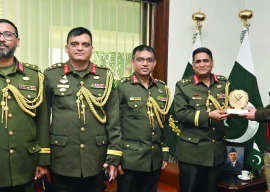
"Of course it's the final word. Pakistan is not attending," the official told Reuters, shortly after the German government urged Islamabad to reverse its stand.
Pakistan pulled out of the conference on the future of Afghanistan on Tuesday in reaction to the “unprovoked” cross-border attack by Nato forces, that plunged US-Pakistani relations deeper into crisis.
The decision was taken at a cabinet meeting chaired by Prime Minister Yousaf Raza Gilani in Lahore.
US Secretary of State Hillary Clinton said she regretted Pakistan’s decision to boycott the conference but hoped to secure Islamabad’s cooperation in future.
“Nothing will be gained by turning our backs on mutually beneficial cooperation. Frankly it is regrettable that Pakistan has decided not to attend the conference in Bonn,” Clinton told a news conference in South Korea.
Afghan President Hamid Karzai had telephoned Gilani to urge him to reconsider the boycott of the conference, officials in both countries said.
Karzai’s deputy spokesman Siamak Herawi told AFP that Pakistan was an important participant in the conference aimed at bridging peace after 10 years of war against the Taliban, and expressed hope that they would ultimately attend.
“President Hamid Karzai called Prime Minister Gilani and officially asked the Pakistan government to participate in the Bonn conference,” said Herawi.
German Chancellor Angela Merkel said she was “very sorry” about Pakistan’s announced boycott of the conference and would try to convince it to attend.
Merkel said Germany would “see what could be done to change” Islamabad’s decision to stay away from the meeting in the western German city.
COMMENTS (50)
Comments are moderated and generally will be posted if they are on-topic and not abusive.
For more information, please see our Comments FAQ
1736930668-0/Untitled-design-(97)1736930668-0-405x300.webp)

1736929668-0/Untitled-design-(96)1736929668-0-165x106.webp)

1736929186-0/BeFunky-collage-(50)1736929186-0-165x106.webp)
1735037307-0/Tribune-N-(1)1735037307-0-270x192.webp)





1732012115-0/Untitled-design-(14)1732012115-0-270x192.webp)
1736844405-0/Express-Tribune-(2)1736844405-0-270x192.webp)










We are all witnessing the aftermath of an incident that is thoroughly testing the complex relationship between Pakistan and the United States. There have been instances before which have spread enough misunderstanding and hostility among the two nations; yet the leadership of both countries have in the end remained committed to working through and resolving these problems. Reason for this lies in the fundamental fact that both countries know what is at stake. We both realize the dire need to work together because peace and stability in Afghanistan are in the national interest of Pakistan, and vice versa. The Bonn Conference is a golden opportunity for Pakistan and Afghanistan to bring their concerns, regarding insurgencies and peace negotiations, to the table and work towards a solution. The future of Afghanistan is of vital importance to all its neighbors. Hence, we, the Afghan government, and even Pakistan have all acknowledged that lasting peace in Afghanistan cannot be achieved without the help of Pakistan. We understand and fully recognize the frustration and anger felt by the Pakistani people and government. However, we cannot help wondering how this decision would benefit the national interests of Pakistan. If Pakistan believes that bringing peace to Afghanistan is good and necessary for Pakistan’s sake, wouldn’t a boycott of the conference prove counterproductive, since peace negotiations with the Taliban is an issue that Pakistan has to deal with in the future?
MAJ Nevers, DET - U.S. Central Command
@Hedgefunder: "I am a bakra or a sheep, can’t figure it out. Can someone please help me?" What difference does it make? Either way, you are destined to be on the plate served over dinner! It is not good to know that for either a bakra or a sheep, is it?
Allah may bless us and also on our country
we are all Pakistani and we should be careful about our solidarity and we should also take decisions with the consent of all the leaders of Pakistan. because its the matter of our lives and our future a war is not the solution of all the crisis that we are facing now ...... in the Holy Quran God says... aur Allah ki rassi ko mazboti sy thamey rakho aur appas me tfarka {phoot } na daloo
@Truth Seeker:
The first thing I don't see your name which is clearly mentioned by Tribune that it is required...
Pakistani: The one who care about Pakistan is called Pakistani, if you have any doubt then please go to psychologist for treatment.
All participating nations in the Bonn conference seem to know how to stroke Pakistan's ego. I think that the more the rest of the participants 'beg' Pakistan to change their mind, the more they secretly enjoy the attention - takes the edge of the recent trauma of the tragic loss. Like some of the other com mentors, my bet is that Pakistan will attend - probably, they will send a lower level delegation - this way they have the cake and eat it too. I am not stating this to insult the people or the nation of Pakistan - this is just my personal opinion.
Yet another absolutely pathetic decision by Pakistan. Our progress to the dark ages has beaten all expectations... the intellect of the average Pakistani is SO low even a mouse could do better than a Pakistani. This nation is headed for such a major disaster it will be epic.
@Hedgefunder: Border issues are between Pakistan and Afghanistan, but they are not going to resolve these issues, so the world will never 'understand' the technicalities of these problems.
@khadim: And will you please define Pakistani keeping the history of Pakistan since 1947. And don't take the cruthches of unity, dignity and honour.
After Memo-gate scandal our leadership is depressed and I think they are going to take this step "can called a Good step in favor of the Solidarity of our country".
I think it will get better results... Hope for the best...
I am a bakra or a sheep, can't figure it out. Can someone please help me?
@Nina Akbar: Unfortunately your nation has been taken over by bakras and sheeps !! I agree with your view.
@Meekal Ahmed: These people really do not have any shame or concern for nation's integrity !!! Its such a shame for such a beautiful country !
Pakistan is making the right decision by not attending!!! I totally support the Pakistani view on this issue, someone would be a fool to disagree with Pakistan at this time!!!
I am of the opinion that Pakistan as a nation should do what it must to get an apology and not getting such things repeated. Apart from that having USA remove from Shamsy airbase and closing of NATO supply through its land for good, is just a too much for a matured nation. See if America and other NATO countries ban imports from Pakistan or just change the rules for Pakistan then it will affect it severely. There is one saying "Don't dive too deep into the water if you have bad lungs". Pakistan itself is suffering from various issues like recent floods, huge foreign debts etc. should not dive too deep into this.
Guess time has come for Pakistan to declare war on the unbelievers/ Kafirs wherever they and take the its rightful place as leader or the Muslim World...
Frankly who is the looser if Pakistan is not attending the Bonn conference ? For nations requesting Pakistan to attend should not be taken as world "begging" Pakistan. People here are quite freely misjudging other nation's civil behavior as begging. All those who commented about showing pride on Pakistan declaring to not attend Bonn. It will be really find to see when in couple of days they will agree to attend. Of course after high drama and media hype to keep their nose up. Bottom line is Pakistan is in need here. It is just acting like a spoil brat because world is giving it attention. Please mind not all attention are "good" attention. So stop bragging and bite the reality pill.
I read in another newspaper that Pakistan is putting some conditions to attend Bonn conference?????
I think India should be invited. They have recently signed a strategic partnership (civilian/military) with Afghanistan and hence have a right to be there. Let's see what USSR and US/NATO/ISAF could not do in Afghanistan how will India do that?
For once ....Stick to your words ... and dont attend it even if the world begs to .... lets see what pakistan can do now ... show the metal pakistanis .... Let people of the world think of other solutions which they might have already ... It will be time for them to execute those plans ... and then Pakistan will have to think of some trick to get into the conference .... again ... what a sad story that will be .,..
I as a Pakistani woman, agree with Zalim Singh I refuse to be a mindless follower like many who are so brain washed they refuse to see this boycott as a NEGATIVE action for Pakistan The question is who is begging whom? it shows the immature aspect of Gilani who instead of using THE WORLD STAGE to air our grievances when we have the ears of the WHOLE WORLD we rather show our empty might to have a temper tantrum, so with the end came we achieve NOTHING! for those who support this boycott you have just earned a position in the class of inconvenient imbeciles.
Only one thing - WELL DONE PAKISTAN..........................I am a proud Pakistani Today.
@Meekal Ahmed: Hello, hope you are well ! This is a very sad decision from Pakistan, as the Global Community will take negative view, as to their conduct over past decade in fight against terrorism !!! On other front, it may help the world understand the unruly border issue between these two nations and its indegenous people on both sides of this border.
Lets see how far they go before deciding to join the conference.....
Bone conference??
Karzai is well aware that his govt won't last even a month after US NAtO leave until It gets Pakistans help
@Babloo: If you want to live in fol's paradise...its your choice....I only wonder whether you are Indian or not. Obviously we Indians are not that insane...
If Pakistan is not at the Bonn table, then it will a part of the menu. Get your 'knife' in there. Stop behaving like a spoilt school boy.
@zalim singh: Read the article carefully...you will get your answer
Thank you Pakistan. NATO/Afghanistan can now have a productive, purposeful conference without disruptive elements.
@Cautious: Indians shouldn't poke their nose where they are not welcomed. Once US leaves afghanistan, the endians are gonna have really nice time there. mark my words
Instead of pressing the issue to attend the Bonn Conference, participants should wear the shoes of Pakistan and consider it in that way.
Or 24 Army personnel are killed and still various countries expect Pakistan to attend the Bonn Conference? What a pity.
Wasn't very long ago that Pakistan was whining because they were left out of the process -- suspect this petulant action is a good example of why some think your part of the problem rather than the solution.
@Zalim Singh...Here they are..
http://tribune.com.pk/story/299976/us-urges-pakistan-to-reconsider-bonn-talks-boycott/ http://tribune.com.pk/story/299968/germany-hopes-pakistan-will-still-attend-afghanistan-meeting/ http://tribune.com.pk/story/299507/kabul-says-pakistan-important-to-bonn-conference/
isn't it a better option to attend the conference but keep the supply routes permanently closed
Just a fake attempt to show bravado when we stand with no clothes on.
Planed conspiracy,in retaliation final words has been spoken by the authority, it is very hard to take back, Bonn Conference mean peace and stability in the region,specially in Afghanistan and Pakistan as well. Some days are remained Bonn conference going to held,but the Pakistani out post has badly been targeted,effort is made for statuesque,some powers want no change no peace in the region,it is dire need of the time,will have find them first then move toward the peace process.
What did Pakistan in retaliation,he use its right,closing the routs of supply to the aggressor forces stationed in Afghanistan,refused to take part in the Bonn conference and other reactionary steps are under consideration.
Small states of the world,who are members of the united nations looking toward The league of nations with hope full eyes,which is still silent on the incident happened in Pakistan,Secretary general has power under the global law to take notice of the unprovoked attack and indiscriminate firing by helicopter. Pakistan should go there and file its case before the security council and take a decision on this aggression,as for as tripartite meeting is concerned it has lost its value,and not a dependable and lost its credibility absolutely.
Once you have decided to boycott and all the nations accepted it, then why again, quarter final, semi final and final stuff, it shows some other intention of blackmailing.
“Nothing will be gained by turning our backs on mutually beneficial cooperation. Frankly it is regrettable that Pakistan has decided not to attend the conference in Bonn,” Clinton told a news conference in South Korea.
Frankly it is regrettable that Allies are deliberately killing partners.
Zalim singh: The world but not you because it's in your interest not to.
Boycott of all western efforts to play their own game with their own rules of war agaist terrorism; they dont see terrorism and mass genocide in African countries and running after OIL, MINERALS and RAW MATERIALS to keep their factories running ... shame on us , our corruption and begging for foreign aid ....
Better late then Never . I wish Pakistan pulls out of this End game and Afghan War asap But i am pretty sure they wont let US get out of this crap ! US came with there Will in this region but will only leave this region on Pakistan's will. ! ! ! It aint that simple for them and i hope our govt and forces are well aware of this fact .
@zalim singh: "German government urged Islamabad to reverse its stand."
“President Hamid Karzai called Prime Minister Gilani and officially asked the Pakistan government to participate in the Bonn conference,” said Herawi.
Woohoo! they got what they deserve.
I think Pakistan Govt has decided to change its policy after MEMOGATE scandel...
Now they are behaving like Pakistani...
and who exactly is begging you to?